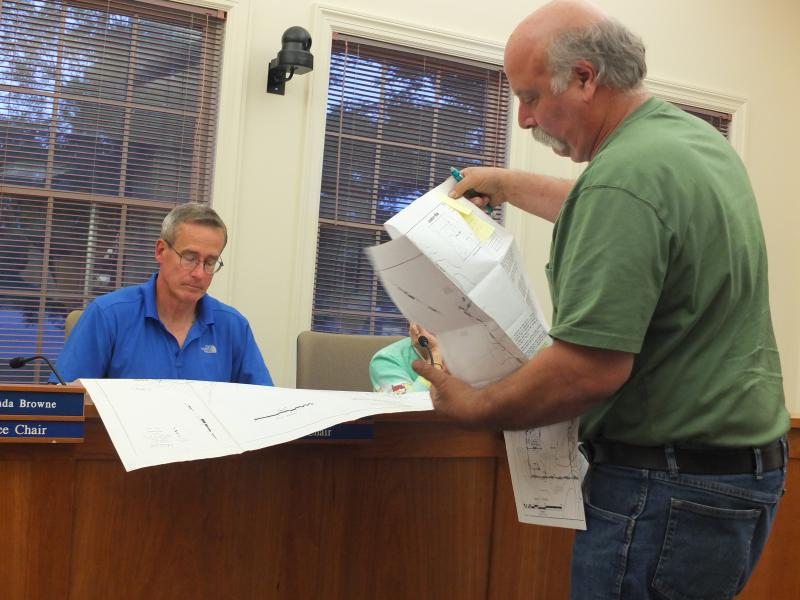Coloradans advise Boothbay on legalized pot industry
So goes Colorado, so goes the nation. In 2013, the Rocky Mountain State became the first to finalize and adopt rules for recreational marijuana sales. Four years later, Maine is in the process of joining 28 other states following Colorado’s lead.
Boothbay is one of 400-plus Maine municipalities drafting ordinances for regulating the new recreational marijuana industry which begins after a state moratorium expires in February 2018. On Aug. 16, the Boothbay Planning Board received advice from two Colorado businessmen on how they adapted to a rapidly growing and changing legalized marijuana industry.
East Boothbay summer resident Tom McFall and his business partner Eric Bryant explained how they operated their medical and retail marijuana businesses in Colorado. McFall and Bryant said the industry has gone through many changes in how Colorado regulates recreational and medical marijuana businesses.
“We were in the same place you are now,” said McFall, who has been a seasonal resident in East Boothbay for 42 years. “We’ve seen it all, and Colorado has put in place regulations which have over time made the industry successful for everyone.”
The businessmen said Colorado’s marijuana sales tax provides funds for municipal projects like schools and parks which benefit the entire community. Recreational marijuana nationwide is a $21 billion a year industry, they said. The discussion turned to how Maine would share marijuana tax revenue from recreational marijuana sales.
Darrelll Gudroe is a consultant with Pharmers Market, a medical marijuana caregivers business in Boothbay. Gudroe and his business partner Jan Martin are also considering operating a retail marijuana business in town next year. Gudroe has monitored the state legislature’s work on developing statewide rules and regulations for legalized recreational marijuana in the past year. He said the state plans to issue licenses for selling and growing recreational marijuana.
“They would split license fees equally with municipalities,” Gudroe said. Planning Board Chairman Alan Bellows added, discussions in Augusta also centered around a 20 percent sales tax with a 15 to 5 percent split between the state and the local municipality.
“Colorado pays a lot more tax than that but it hasn’t slowed down the sales.” said Bryant.
Legal marijuana has also drawn more tourists to Colorado, according to the Coloradans. “About 20 percent of our business is from tourists. They come from all over the U.S. and world because of the legalized industry,” McFall said.
The Colorado experience also shows a mature clientele. The estimated average age of customers in their retail dispensaries is about 40 years old. The fastest-growing demographic in Colorado are users over 55. The second fastest-growing are users over 65.
“The data shows no real growth in teens using marijuana (since legalization). It’s all mostly an older group using legal marijuana, and you will probably see that, too,” McFall said.
The two businessmen warned Boothbay against opening up the industry to many vendors. They said communities the size of the Boothbay Region should only have one or two shops.“Colorado made a mistake in the beginning by opening it up to everybody. No limits on number of shops. This wasn’t good for anybody,” McFall said.
The two men also commented on Boothbay’s proposed ordinance slated for a vote in November to limit retail and growing facilities to the C-2 zone and Industrial Park. They agreed keeping marijuana businesses away from densely populated locations was better for the public.
In other action, the board approved three building permits. The board unanimously approved an access platform permit for James and Mary Duffy for their 420 Barters Island Road property. The Duffys received approval to construct a pressure-treated wooden 4-by-6-foot access platform with 3-by-14-foot stairs, 6-by-5-foot pier, an aluminum 3-by-30-foot ramp and a pressure-treated wooden 110-by-20-foot float. The property is in a special residential and shoreland overlay zone.
The second permit went to John H. Welsh, Jr. He received approval for a pier at his 142 Dover Road property. The permit allows construction of a 6-by-5 foot pier with a seasonal 26-by-3-foot runway to a 10-by-20-foot float parallel to the shore. The pier also includes a skidway consisting of two 30-foot long, 6-by-6-foot beams 10 feet a part on Cross River. The property is in a general residential and resource protection overlay zone.
The third permit went to John and Leslie Malone. They received approval to repair a log cabin on 32 Dover Road. The permit includes a 6-by-14-foot roof overhang addition used for picnics. The roof will be supported by posts and will be over a graveled area. The extended roof will also be used for all-terrain vehicle storage.
The board will meet next at 6:30 p.m. Wednesday, Sept. 20 in the municipal building’s conference room.
























